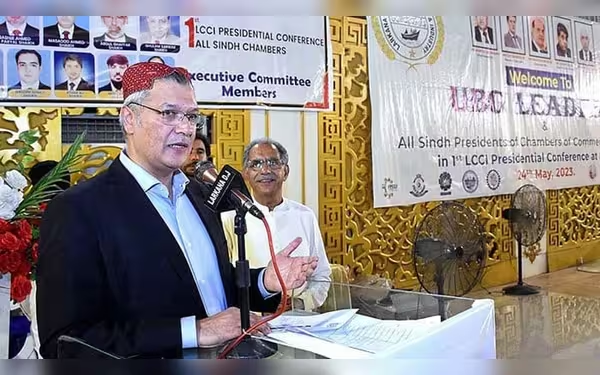Thursday, November 7, 2024 09:56 AM
UBG Chief Urges 500bps Policy Rate Cut as Inflation Drops to 6.9%
- Inflation falls to 6.9% from 38% in May 2023.
- S M Tanveer calls for 500bps rate cut by January 2025.
- GDP growth projected at 3.9% for 2025.
 Image Credits: geo
Image Credits: geoS M Tanveer of UBG calls for a 500bps policy rate cut as inflation drops to 6.9%, urging a business-friendly environment for economic growth.
In recent months, Pakistan has witnessed a significant shift in its economic landscape, particularly concerning inflation rates. The patron-in-chief of the United Business Group (UBG), S M Tanveer, has made a bold call for an immediate reduction of 500 basis points in the policy rate. This request comes on the heels of a remarkable decline in inflation, which has plummeted to 6.9% from a staggering peak of 38% in May 2023. Such a drastic change strengthens the argument for lowering the current high-interest rates, which have been a point of contention among business leaders and economists alike.
According to data released on Tuesday, Pakistan's annual consumer price inflation has slowed significantly, reaching its lowest level in over three years. In September, the inflation rate was recorded at 9.6%, marking the first single-digit reading in nearly three years. This is a notable drop from 27.4% during the same period last year and 11.1% in July. Tanveer emphasized that the central bank should aim to reduce the policy rate to 8% by January 2025, highlighting the urgent need for a more business-friendly environment.
The State Bank of Pakistan (SBP) has already taken steps in this direction, having cut the key policy rate by 200 basis points to 17.5% last month. This decision was made after inflation eased to single digits for the first time in nearly three years. The SBP has reduced interest rates three times this year, expressing confidence that inflation is under control after previously raising rates to an all-time high of 22%.
Tanveer pointed out that a comparison of Pakistan's macroeconomic indicators between June 2023 and September 2024 reveals significant improvements. These advancements have led to the approval of an International Monetary Fund (IMF) package, which is crucial for the country’s economic stability. He noted that the statistics reflect the efforts of Prime Minister Shehbaz Sharif’s government and the Special Investment Facilitation Council (SIFC) in fostering economic growth.
However, Tanveer also cautioned that more work is needed to operationalize closed business activities through a single-digit interest rate and reduced energy tariffs. He stated, "Both the economic indicators and the IMF package are enough to raise a demand that the government should ensure a business-friendly environment and let the business and exports grow to promote investment and employment in the country." This sentiment underscores the importance of creating a conducive environment for businesses to thrive.
Economic data further supports this call for action. The GDP growth rate has increased from 0.29% to 2.38% during the specified period, with projections for 2025 hovering around 3.9%. Additionally, the trade deficit has narrowed from $27.47 billion to $24.09 billion, while the current account deficit has improved from $2.55 billion to -$0.68 billion. Exports have surged from $27.7 billion to $30.6 billion, with agricultural exports rising from $4.7 billion to $7.1 billion. Notably, Information Technology (IT) exports have also seen a jump from $2.6 billion to $3.2 billion, and remittances have increased from $27.3 billion to $30.2 billion.
As the value of the rupee has improved from Rs333.5 to Rs278 per dollar from June 2023 to September 2024, it is evident that the economic indicators are moving in a positive direction. This progress is encouraging, but it is essential for the government to continue fostering a business-friendly environment to sustain this growth. The call for a policy rate cut is not just about numbers; it is about creating opportunities for businesses and, ultimately, improving the lives of everyday Pakistanis. As the nation navigates these economic changes, the focus must remain on ensuring that growth translates into tangible benefits for all citizens.













